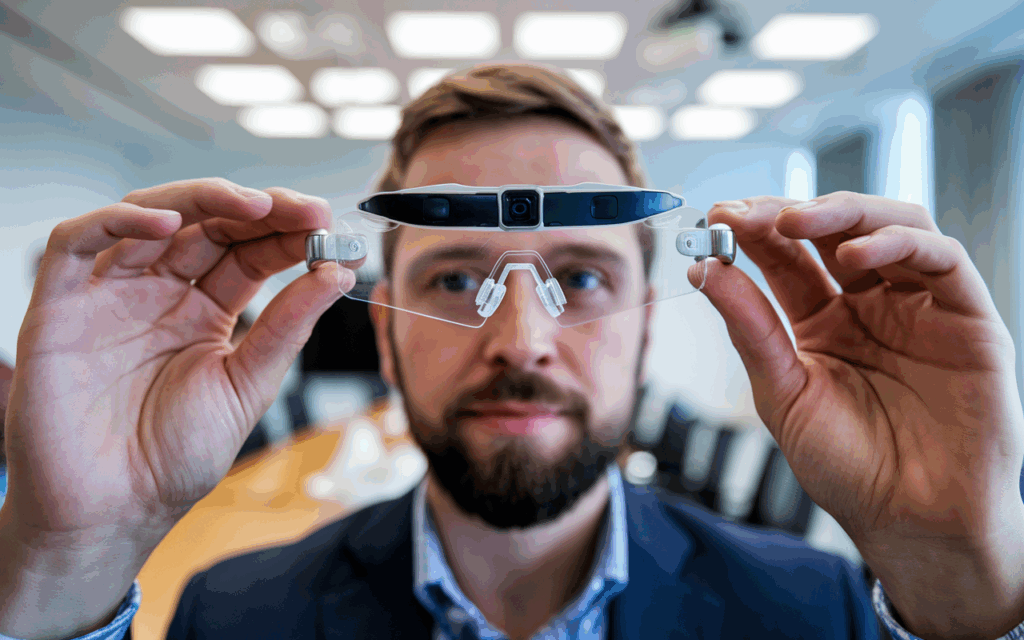The Future is Now: Harvard Dropouts Launch "Always-On" AI Smart Glasses! 👓🚀
In a bold move that blurs the lines between privacy and technological advancement, former Harvard students AnhPhu Nguyen and Caine Ardayfio are taking the wearable tech landscape by storm with their new startup, Halo. Their latest offering? AI-powered smart glasses that are “always on,” capable of listening to and recording every conversation while providing real-time information to the wearer. Sounds futuristic, doesn’t it? Well, it's here! 🌐✨
The Inside Scoop on Halo's Smart Glasses
These revolutionary glasses are designed to enhance memory and intelligence, giving wearers the ability to retrieve information and respond to complex inquiries with ease. Imagine being in a conversation and suddenly forgetting a fact—these smart glasses are claimed to solve that dilemma by offering insights right when you need them. As Ardayfio puts it, “It's like having infinite memory.” But with great power comes great responsibility… and concern! ⚡💡
While the glasses promise to make you "super intelligent" at the moment you put them on, they also raise significant questions regarding privacy and consent. Critics are warning that the normalization of covert recording in public spaces could severely impact societal norms and expectations of privacy. 📜🔒
The Ethical Dilemma
One of the most significant drawbacks is the lack of an external indicator to warn others when conversations are being recorded, unlike Meta’s Ray-Ban smart glasses, which offer such a feature. This raises the stakes for both users and innocent bystanders. Will we soon live in a world where privacy is just an illusion? 🤔
Eva Galperin, a cybersecurity expert from the Electronic Frontier Foundation, echoed these concerns, saying: “Normalizing the use of an always-on recording device… eats away at the expectation of privacy we have in all kinds of spaces.”
Legal Implications 🏛️
It’s also essential to look at the legal landscape: many states in the U.S. require consent from all parties involved before recording conversations. While Ardayfio and Nguyen expect users to obtain this consent, is it realistic to trust individuals to be responsible with such powerful technology?
Future Prospects and Pricing
Despite these controversies, the market appears eager for innovation. With a price point of $249 and a $1 million funding boost from investors, the glasses will be available for preorder soon. The co-founders are optimistic, even suggesting that the backlash against privacy in tech could lead to the widespread adoption of their product before larger companies take the plunge.
In Conclusion
As we step into this brave new world, technology like the Halo smart glasses poses a double-edged sword. They offer unprecedented opportunities to enhance human memory and knowledge but tread carefully—approaching privacy, ethics, and consent issues that could redefine societal standards.
Would you be willing to embrace the future with such technology? Drop your thoughts in the comments below! 💬⬇️
Stay tuned for more updates on innovations shaking up the tech world! Until then, share this post with friends who might get a kick out of modern tech—just don’t forget to ask for their consent first! 😜✌️
#SmartGlasses #AItechnology

More Stories
Meta’s AR Ambitions and AI Safety: Insights from the Equity Podcast
Insight Partners Data Breach: A Wake-Up Call for Cybersecurity Awareness
Lovable’s Ascendancy: Anton Osika at TechCrunch Disrupt 2025